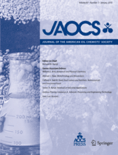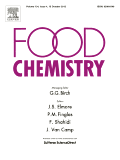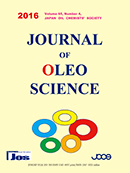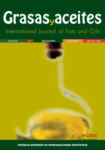
JOURNAL OF THE AMERICAN OIL CHEMISTS SOCIETY
Scope & Guideline
Exploring the Frontiers of Organic Chemistry
Introduction
Aims and Scopes
- Oils and Fats Chemistry:
Research on the chemical properties of oils and fats, including lipid oxidation, emulsification, and structural characteristics. - Food Science and Nutrition:
Studies exploring the nutritional aspects of oils and fats, their health benefits, and their roles in food formulations. - Biotechnology and Enzymatic Processes:
Application of biotechnological approaches, including enzymatic reactions for oil extraction, modification, and quality enhancement. - Sustainable Practices and Green Chemistry:
Research focused on sustainable processing methods, including the use of bio-based solvents and environmentally friendly extraction techniques. - Functional Lipids and Bioactive Compounds:
Investigation into the bioactive properties of lipids and their potential health benefits, including anti-inflammatory and antioxidant effects. - Industrial Applications:
Exploration of the industrial uses of oils and fats, including lubricants, biodiesel production, and packaging materials.
Trending and Emerging
- Plant-Based Oils and Proteins:
An increasing focus on plant-based oils and proteins reflects the growing consumer demand for sustainable and health-conscious food products. - Functional Foods and Nutraceuticals:
Research has expanded into the health benefits of oils and fats, particularly their roles as functional ingredients in nutraceuticals and health supplements. - Advanced Processing Technologies:
Emerging technologies, such as high-intensity ultrasound and microfluidization, are being investigated for their applications in improving oil extraction and processing efficiency. - Lipidomics and Metabolomics:
The integration of lipidomics and metabolomics approaches is gaining traction, facilitating a deeper understanding of lipid functions in biological systems. - Edible Oleogels and Fat Replacers:
Research into oleogels and other fat replacers is trending, driven by the need for healthier alternatives to traditional fats in food products.
Declining or Waning
- Traditional Oil Extraction Methods:
Research related to conventional oil extraction techniques has diminished as newer, more efficient methods such as supercritical fluid extraction and enzymatic processes gain popularity. - Synthetic Oils and Fats:
Studies focusing on synthetic oils have reduced, likely due to an increased emphasis on natural and sustainable sources of fats and oils. - Basic Research on Oil Properties:
There has been a decline in purely theoretical studies on oil properties, as applied research with practical applications takes precedence. - Animal-Based Fats:
Research on animal fats is waning, possibly due to a growing trend towards plant-based alternatives and concerns over health and sustainability.
Similar Journals

Green Chemistry Letters and Reviews
Exploring the intersection of chemistry and environmental stewardship.Green Chemistry Letters and Reviews is a premier Open Access journal published by TAYLOR & FRANCIS LTD, dedicated to advancing the field of green chemistry through the dissemination of high-quality research and innovative reviews. With a focus on sustainable practices and environmental impacts, this journal positions itself at the nexus of chemistry and environmental science, achieving impressive rankings in both categories—Q1 in Chemistry (miscellaneous) and Q1 in Environmental Chemistry as of 2023. This esteemed publication, based in the United Kingdom, not only promotes critical research but also encourages accessibility, having been an Open Access platform since 2012. With a robust H-Index reflecting its academic influence, Green Chemistry Letters and Reviews serves as an essential resource for researchers, professionals, and students seeking to engage with cutting-edge developments in green chemistry from 2007 onwards, continuing its impactful journey into 2024 and beyond.

Food Chemistry
Elevating Standards in Food Safety and QualityFood Chemistry, published by Elsevier Science Ltd, is a leading international journal dedicated to the publication of high-quality research in the field of food chemistry. Established in 1976, this journal has made a significant impact in its realm, with an impressive 2023 impact factor and ranked Q1 in Analytical Chemistry, Food Science, and miscellaneous Medicine categories. It currently holds a remarkable Scopus ranking of #3 in Analytical Chemistry and #11 in Food Science, signifying its relevance and prestige among the top scholarly publications. With a wide scope that includes the chemistry of food composition, flavor, and safety, Food Chemistry serves as an essential resource for researchers, professionals, and students alike, offering insights and advancements in food analysis and technology. Access options may vary, and the journal is committed to disseminating innovative findings to foster knowledge and application in the dynamic field of food science.

Vietnam Journal of Chemistry
Exploring the Frontiers of Chemical ScienceVietnam Journal of Chemistry, published by WILEY, is a prominent academic journal that serves as a platform for the dissemination of innovative research in the field of chemistry. With its ISSN 0866-7144 and E-ISSN 2572-8288, this journal has made a significant impact on the global scientific community, evidenced by its 2023 Scopus ranking as #274 in the General Chemistry category and a commendable percentile of 32nd. The journal, categorized in the Q3 quartile for miscellaneous chemistry subjects, aims to foster communication among chemists from Vietnam and around the world, encouraging collaboration and the exchange of cutting-edge knowledge. While it currently does not offer Open Access options, the Vietnam Journal of Chemistry is committed to contributing valuable insights from its coverage years spanning from 2018 to 2024, making it a worthy resource for researchers, professionals, and students dedicated to advancing the field of chemistry. Based in the United Kingdom, it stands as a testament to the vibrant research endeavors emerging from Vietnam and beyond.

JOURNAL OF THE INDIAN CHEMICAL SOCIETY
Advancing Chemical Knowledge from India to the WorldJournal of the Indian Chemical Society, published by Elsevier, stands as a cornerstone in the field of chemistry, particularly representing the rich chemical research emanating from India.
With a significant history dating back to its establishment, this journal encompasses diverse disciplines including Drug Discovery, Electrochemistry, Inorganic Chemistry, Organic Chemistry, and Physical and Theoretical Chemistry, reflecting the evolving landscape of chemical sciences.
Despite being positioned in the Q3 category across multiple quarters, the journal demonstrates promising rankings in various chemistries, highlighting its commitment to advancing the knowledge and application of chemical sciences. While currently not available as an open access journal, the Journal of the Indian Chemical Society is dedicated to providing a platform for high-quality research that fosters innovation and collaboration among researchers, professionals, and students worldwide.
With its continuous publication from 1973 to the present, it serves as an essential repository for cutting-edge findings and developments in chemistry, striving to connect academia with industry and practice.

ACS Food Science & Technology
Transforming Food Science Through Innovative ResearchACS Food Science & Technology is a premier peer-reviewed journal published by the American Chemical Society (ACS) that addresses the dynamic intersections of food science, chemistry, and technology. With its E-ISSN: 2692-1944, this journal aims to disseminate innovative research and comprehensive reviews that enhance understanding in fields such as analytical chemistry, organic chemistry, and general food science. Despite the absence of an Open Access model, its position in the Q2 quartile for multiple categories in 2023 underscores its significant impact on the scholarly landscape, ensuring researchers can access high-quality research pertinent to today's food challenges. With an expanding timeline of 2021 to 2024, ACS Food Science & Technology is poised to be an essential resource for advancing the scientific community's knowledge, fostering collaboration, and bridging gaps between academia and industry.

Journal of Oleo Science
Unlocking the Potential of Oleochemicals in Research and IndustryJournal of Oleo Science, published by the Japan Oil Chemists Society, stands as a pivotal resource in the domains of chemical engineering, chemistry, and medicinal applications, with a robust commitment to advancing knowledge in oleochemical research and technology. With an ISSN of 1345-8957 and an E-ISSN of 1347-3352, this open-access journal has been accessible to a global audience since 2021, facilitating the dissemination of high-quality scholarly articles and fostering collaboration among researchers. The journal, which has converged its publication scope from 2001 to 2024, currently holds a respectable Q3 ranking across multiple categories, reflecting its impact in the academic sphere. With Scopus ranks highlighting its position in general chemistry and chemical engineering, the Journal of Oleo Science not only serves as an essential platform for the latest developments in oleo science but also encourages the exploration of innovative approaches to tackling industry challenges. Articles submitted to the journal are subjected to rigorous peer review, ensuring that only the most significant and scholarly work is presented. By championing diverse perspectives and research findings, this journal is an invaluable asset for students, professionals, and academics dedicated to advancing the fields of oleochemistry and beyond.

JOURNAL OF SURFACTANTS AND DETERGENTS
Exploring Innovations in Surfactants and DetergentsJournal of Surfactants and Detergents, published by Wiley, is a prominent peer-reviewed journal dedicated to advancing scientific knowledge in the field of surfactants, detergents, and their applications. With an ISSN of 1097-3958 and an E-ISSN of 1558-9293, this journal serves as an essential resource for researchers, industry professionals, and students specializing in Chemical Engineering, Physical and Theoretical Chemistry, and Materials Science. Since its inception in 1998, the journal has fostered innovative research and multidisciplinary collaboration, reflected in its current Q3 ranking in several Scopus categories. Although it operates under a traditional publishing model, the journal's robust research contributions continue to engage a wide audience eager to explore the latest developments in surfactant and detergent science. As a key player in the field, the journal not only publishes cutting-edge research but also facilitates dialogue and knowledge exchange, making it an invaluable asset for anyone invested in the chemistry of surfaces and interfaces.

Food Chemistry: Molecular Sciences
Pioneering Research for a Healthier TomorrowFood Chemistry: Molecular Sciences is a leading academic journal published by ELSEVIER, dedicated to advancing knowledge in the fields of food science and molecular biology. With an ISSN of 2666-5662, this journal is a key platform for researchers and professionals aiming to disseminate innovative research findings from 2020 through 2024. Recognized for its quality, it stands in the Q1 category for Food Science and Q2 for Molecular Biology as of 2023, showcasing its commitment to high-impact publications. The journal is indexed in Scopus, earning ranks of #98/389 (74th percentile) in Agricultural and Biological Sciences - Food Science and #214/410 (47th percentile) in Biochemistry, Genetics and Molecular Biology - Molecular Biology. Each article represents cutting-edge research that drives the understanding and application of molecular principles in food chemistry, making it an essential resource for anyone involved in the field. Although this journal does not offer open access, its rigorous peer-review process ensures that the content is reliable and of significant academic value, contributing profoundly to the body of knowledge in the respective disciplines. Located in Amsterdam, Netherlands, Food Chemistry: Molecular Sciences continues to inspire scholarly discussion and innovation within the scientific community.

GRASAS Y ACEITES
Bridging research and application in food science.GRASAS Y ACEITES, published by the Consejo Superior Investigaciones Científicas (CSIC)Food Science and Organic Chemistry since 1991. Based in Madrid, Spain, this journal facilitates the dissemination of innovative research and cutting-edge discoveries pertaining to fats and oils, addressing both their nutritional properties and functional applications. The journal holds a commendable position within the academic community, ranking in the third quartile in both its categories as of 2023, and features a dedicated platform for dialogue among researchers, professionals, and students. By providing unhindered access to its publications, GRASAS Y ACEITES fosters a collaborative environment for advancing knowledge and understanding in its respective fields, making it an essential resource for those invested in food science and organic chemical research.

Rivista Italiana delle Sostanze Grasse
Transforming Understanding of Fatty SubstancesRivista Italiana delle Sostanze Grasse is a prominent journal in the field of Organic Chemistry, published by INNOVHUB SSI-AREA SSOG in Italy. With an ISSN of 0035-6808, this journal serves as a crucial platform for disseminating cutting-edge research and innovation related to fatty substances and their applications in various industries. Though its impact factor is yet to be established, it holds a notable position in the 2023 Scopus Rankings, being categorized in the Q4 quartile for Organic Chemistry, ranking #197 out of 211 journals in this field. The journal's converged years span from 2006 to 2024, showcasing a commitment to ongoing scholarly discourse. Researchers, professionals, and students alike value this journal for its rich contributions to understanding the chemistry behind oils and fats, and the latest advancements in substances relevant to food science, pharmaceuticals, and sustainable practices. While the journal is not currently open access, it is a critical resource for those seeking to expand their knowledge on the intricate roles of organic compounds in various applications.